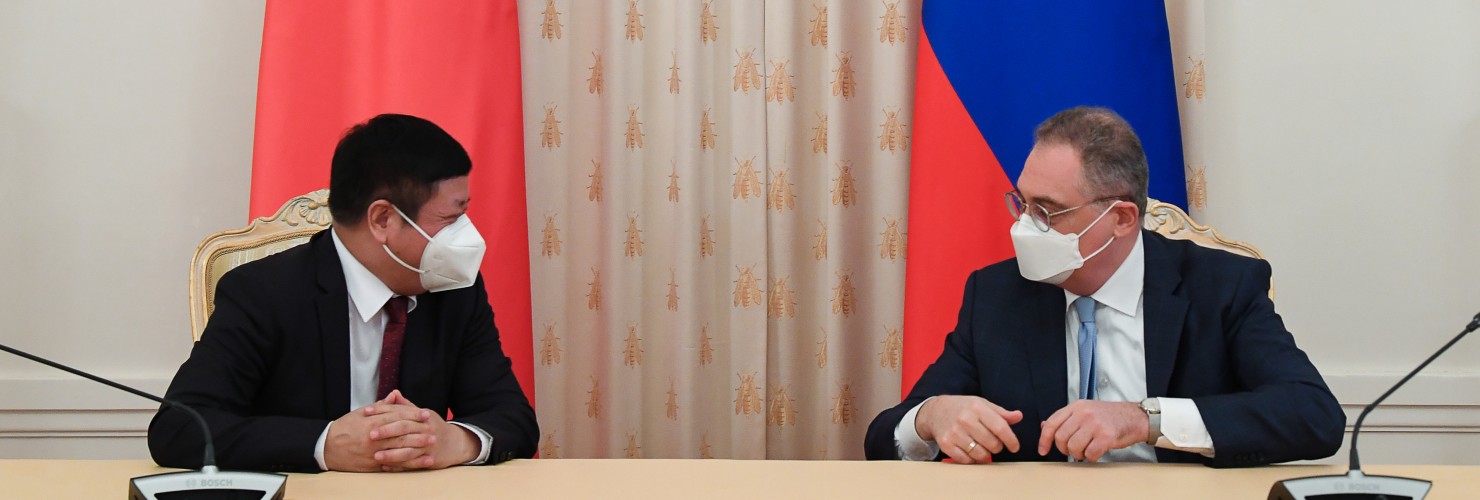

MERICS China Security and Risk Tracker
3/2021
Focus topic: From marriage of convenience to strategic partnership: China-Russia relations and the fight for global influence
Beijing and Moscow have gone to great lengths to publicly reaffirm their strategic partnership. They have done so amid rising geopolitical competition and re-emerging transatlantic cooperation over how to deal with China. However, the Sino-Russian relationship is not a full alliance. Tensions remain, which could eventually undermine the partnership. Meanwhile, however, Sino-Russian cooperation already poses challenges and threats to Europe, NATO and the rules-based international order which deserve immediate attention.
Russia and China have renewed the 20-year-old Sino-Russian Treaty of Good-Neighborliness and Friendly Cooperation. The 2001 treaty’s renewal on June 28, 2021, provided a show of unity a fortnight after the NATO summit declared that China’s “ambitions and assertive behavior presents systemic challenges to the rules-based international order” and to Alliance security. China’s military links with Russia were also singled out.
President Vladimir Putin hailed the treaty as a “fundamental international legal document” that "plays a stabilizing role in global affairs," while President Xi Jinping has called it a “vivid example of building a new type of international relations and community with a shared future for mankind.” Although it falls short of binding China and Russia into an alliance, it does outline their shared concerns over the current global order and sets out a framework to cooperate in reforming it.
In 2001, the agreement was described as "an act of friendship against America," at a time of deteriorating relationships following NATO’s bombing of Yugoslavia and direct hit on China’s embassy in Belgrade. Today, Russia and China are once more feeling the pressure. But what may have started as a marriage of convenience has evolved into something much more solid over the years.
A strategic partnership for the “new era”
In 2019, Beijing and Moscow upgraded the relationship to the highest level of partnership within China’s hierarchy of diplomatic ties - a Comprehensive Strategic Partnership of Coordination for a New Era. The upgrade committed them to cooperate on key international issues, from global governance to defense and security affairs.
Russia and China share broad agreement on their approaches to many big issues, ranging from cyberspace to global governance, human rights and the economy. But topping the list is their shared opposition to the Western-led rules-based international order and belief that the US is their main adversary.
Worsening relations between China and the West have brought these commonalities to the fore. For instance, Russian and Chinese officials have been sanctioned under the EU’s new global human rights sanctions regime, triggering strong responses from both Beijing and Moscow. China’s Foreign Minister Wang Yi and his counterpart Sergei Lavrov have commented that sanctions are drawing them closer together and accused the West of “imposing their own rules on everyone else, [rules] which they believe should underpin the world order.”
China and Russia have increased their cooperation in recent years. They have showcased their close military ties with joint exercises and drills and have teamed up in the United Nations Security Council (UNSC) to block measures that target themselves or their partner countries. Their economic ties also remain strong. Russia is still China’s top arms supplier, as arms-trade restrictions limit Beijing’s access to other markets. Cooperation is also expanding into the science and technology field. In 2021, Beijing and Moscow announced projects to build a joint lunar research station and to cooperate on nuclear energy. China and Russia have also pledged cooperation on data security, and there are concerns that they may increasingly coordinate actions and strategies, and even share intelligence.
Sino-Russian military cooperation and alignment on ideas of global governance, and their growing coordination on other matters of relevance to Europe and NATO - from hybrid warfare and disinformation to arms control issues or their presence in the Arctic - already threaten European interests, security and the rules-based international order.
Competition over spheres of influence may cause friction
However, the Sino-Russian relationship is not a full alliance. There are clear limits to what each party will do for the other. China, for instance, refused to publicly support Russia’s annexation of Crimea, and Moscow has so far decided not to get involved in the South China Sea dispute or in cross-Strait relations.
Beyond the grand statements about friendship and cooperation, the interests of Beijing and Moscow are not fully aligned. Their relationship is marred by a degree of distrust that will only grow as the balance of power between them tilts further in China’s favor. Whereas China’s economy continues to grow and Beijing’s global influence is rising, Russia’s economy is stagnant and plagued by inefficiencies that will gradually diminish Moscow’s global sway.
Friction is most likely to materialize first in third countries where the two sides will vie for influence, as Russia fights to retain its sphere of influence and avoid losing strategic autonomy. Signs of such tensions are already starting to emerge. Many in Moscow are becoming concerned about China’s footprint in the Arctic and Central Asia – regions that belong to Russia’s traditional sphere of influence – and about the risk that Russia will be replaced as the main actor in both regions.
The ability – and willingness – to respect each other’s interests will be a litmus test for the long-term strength and sustainability of the relationship, visible in how they balance competition and cooperation in third countries.
Afghanistan’s turmoil is likely to provide an early example of whether Russian and Chinese geopolitical ambitions will undermine their alliance against the West. Beijing and Moscow share a primary concern towards Afghanistan: they seek to maintain stability and prevent security threats spilling over into their territories. They are also united in their criticism of US intervention in Afghanistan.
However, Russia has long seen itself as a regional hegemon and is wary of any foreign power’s efforts to increase its presence there. Meanwhile, China has expressed a wish to expand its footprint in Afghanistan and bring it into the Belt and Road Initiative (BRI). Cooperation is possible, but there are signs that Russia and China may be pursuing competing agendas: Moscow and Beijing have both rushed to make bilateral overtures to the Taliban, while touting the Shanghai Cooperation Organization of Central Asian nations (of which they are both members) as a possible mediator.
The way forward for Europe and its allies
Confronted by its diminishing influence, Moscow is likely to fight back against the risk of becoming too dependent on China, whether politically or economically. A push back against Beijing may start in regions that are inside Russia’s traditional sphere of influence, including Central and South Asia, the Middle East, or the Balkans and Black Sea region.
While the relationship may unravel by itself over time, Sino-Russian cooperation already poses clear challenges to Europe, and to the West more broadly, that must be tackled sooner rather than later. Increasingly isolated in the international arena, Beijing and Moscow help amplify each other’s messages and push similar concepts of global governance that threaten the rules-based international order. Russia’s sales of advanced weapons and military capabilities to China are helping the People’s Liberation Army (PLA) fill some of its equipment gaps and advance towards its goal of becoming a world-class military that can fight and win wars by 2049. They are likely to coordinate further in strategic domains, such as hybrid warfare or disinformation.
The strategy often championed by French President Emmanuel Macron and, to a lesser extent, German Chancellor Angela Merkel, of re-engaging Russia, partly to peel it away from Beijing is doomed to fail. Moscow simply has more shared values with Beijing than it does with Brussels, especially on approaches to global governance. Economic carrots are unlikely to sway President Putin’s cost-benefit analysis. These attempts at reengagement and conciliation with Moscow will only encourage President Putin to demand more concessions, and to expand cooperation with China.
A different and more nuanced strategy must be found. Europe and its allies should first and foremost focus on individual issues where they can mitigate the challenges the Russia-China relationship poses to European interests and security. These could include their coordination on hybrid warfare and disinformation campaigns, or their joint attempts to take a leading role in reshaping the norms that underpin the rules-based international order. Tackling these issues will require more information gathering and analysis on the extent of Sino-Russia cooperation; better coordination between EU member states and partners; strengthening existing alliances and building new ones. All this is a prerequisite to effectively push back against actions by Beijing and Moscow in international organizations and elsewhere.
In the longer-term, incremental efforts should also be made to limit the depth and breadth of Sino-Russian cooperation by convincing Moscow that its alignment with China may eventually harm its own interests, and that some cooperation with the West may be possible on specific issues, and preferrable to becoming China’s junior partner. Existing frameworks for Europe-Russia cooperation in the trade, energy, counter-terrorism or environmental sectors could be leveraged for this purpose. While this would most likely not drive Russia entirely away from China and into the arms of the West, it could over time change Moscow’s assessment of the merits of leaning exclusively on Beijing as a global partner.
Domestic stability
Beijing tackles threats to the stability of the system
During the CCP’s 100th anniversary celebrations in July, the central government and party put on a combined show of unity and strength. However, despite the celebrations, the last three months have not been easy for the central government.
When severe floods hit Henan province, the local authorities faced intense criticism for their slow emergency response and their failure to warn local residents, despite red alerts from the Meteorological Bureau. More than 70 people had been reported dead and millions displaced by July 30.
China’s authorities have moved aggressively against individuals who are seen as threats to stability. In Hong Kong, 24-year-old Tong Ying-kit was sentenced to nine years in jail after being found guilty of inciting secession and terrorism, in the city’s first trial under the National Security Law. The verdict was decided by three judges hand-picked by Hong Kong Chief Executive Carrie Lam, instead of a jury, upending the previous legal framework for serious crimes in the city. Meanwhile, mainland farming tycoon and longstanding critic of the CCP, Sun Dawu, was sentenced in July to 18 years in jail for “organizing people to attack state agencies, obstructing public affairs and provoking quarrels.”
Between April and July, nationalistic internet users targeted dozens of Weibo, WeChat and other accounts operated by Chinese feminists, LGBT+ student groups and even the German consulate in Guangzhou. These accounts were shut down after troves of complaints were filed against them for their “politically problematic” content. Chinese nationalists, spurred on by party and government narratives, tend to identify the West as the driving force behind the emergence of LGBT+ issues and feminism. These “Western concepts” are seen as tools the West uses to subvert China’s political values and system.
The party is also trying to tackle China’s serious demographic challenges. On July 20, the government announced a package of measures to improve birthrates; it set an ambitious goal to achieve a more gender-balanced population and ratio of newborns by 2025.
Security and defense
As security risks grow, Xi focuses on the military and partner relationships
President Xi has called for a greater focus on the military and national defense at a time when China is facing heightened security risks. To the east, tensions in the South China Sea and the Taiwan Strait remain high. The PLA has continued to conduct drills and maneuvers in the region, including the largest incursion yet into Taiwanese airspace. And Western countries are also stepping up their military presence in the Indo-Pacific. The last three months have seen a joint exercise between the US, Japanese, Australian and French navies in the region, as well as the start of naval missions by the UK and Germany.
More countries are also clarifying the position they would take in case of a Chinese attack against Taiwan or in the South China Sea, thereby solidifying Beijing’s fears of an emerging Western-led coalition to contain its rise. Japan’s Deputy Prime Minister Taro Aso said in July that his country would get involved if China attacked Taiwan, and US Secretary of State Antony Blinken reaffirmed that Philippine assets in the South China Sea are covered by the mutual defense clause of the US-Philippines treaty.
Meanwhile, the situation in Afghanistan continues to deteriorate, stoking fears in China that instability and terrorism may spill over into its territory. Beijing is unwilling to get too involved in the “graveyard of empires,” but it is seeking to leverage its relationship with the Taliban to make sure its interests will be protected. Foreign Minister Wang Yi hosted a Taliban delegation in Tianjin in late July. He pledged support for their role in the reconstruction of Afghanistan while demanding that they cut ties with the East Turkestan Islamic Movement.
To deal with these heightened threat perceptions, China has also reaffirmed its relations with partners and allies. Beijing celebrated the 20th anniversary of the Shanghai Cooperation Organization, as well as of the 60th anniversary of the Treaty of Friendship, Cooperation and Mutual Assistance between China and North Korea – China’s only treaty ally. Presidents Xi and Putin also renewed the Sino-Russian Treaty of Good-Neighborliness and Friendly Cooperation.
Geopolitical competition
Beijing woos Europe to weaken transatlantic unity
China was among the main topics at the G7, NATO and EU-US summits held in June. The transatlantic partners took the opportunity to reinvigorate their relationship and strengthen cooperation on approaches to China.
Beijing’s reaction to this was as angry as expected. The West was criticized for its “Cold War mentality” and for engaging in “bloc politics” against China. President Xi said China would not accept “sanctimonious preaching from those who feel they have the right to lecture us.” Beijing, however, mostly blames the US for the West’s growing antagonism towards China and the deterioration of bilateral ties. During meetings with US Deputy Secretary of State Wendy Sherman, Chinese officials gave her two lists, detailing China’s red lines and a list of actions for Washington to take to repair the relationship.
The EU, on the other hand, is still seen as a potential partner. China’s authorities are therefore courting European leaders to weaken transatlantic unity. President Xi personally reached out to German Chancellor Angela Merkel, French President Emmanuel Macron and Spanish Prime Minister Pedro Sánchez to push for stronger cooperation between China and Europe. In May, China’s foreign minister Wang hosted his counterparts from Ireland, Poland, Hungary and Serbia in China in May.
Not all is going well for Beijing, however. Lithuania decided to quit the 17+1 framework, calling it “divisive.” Brussels is still developing its toolbox of new instruments to level the playing field with China. It aims to tackle supply chain issues and the impact of foreign sanctions on European actors, among other issues. The new EU-US Trade and Technology Council is another channel that Europe can use to develop common responses to systemic challenges posed by China.
Beijing has continued to use vaccine diplomacy to bolster its international image and to pressure countries into supporting China’s positions on sensitive issues. Ukraine reportedly agreed to remove its name from an international statement about China’s human rights violations in Xinjiang after China threatened to limit trade and withhold access to Covid-19 vaccines.
Economic and tech security
China expands data regulation regime, accepting an economic price for strategic objectives
China’s authorities are rolling out an extensive regulatory framework for managing data on digital networks. The Data Security Law comes into effect in September and the Personal Information Protection Law is expected to be adopted later in 2021. Definitions of key terms such as “important data” and “core national data” remain unspecified for now.
China’s data regulations increasingly focus on specific activities and economic sectors. Examples include draft regulations on data generated by automobiles and review obligations for companies holding large amounts of personal information that seek listing on foreign stock exchanges.
More regulation could either increase risks or ease them. In the latter case, more certainty on the authorities’ key terms and decision-making parameters might cut compliance burdens and administrative risks. Foreign actors conducting large volume or potentially sensitive data exchanges with Chinese actors need to monitor these ongoing developments, and to be especially alert to potential conflict with other national or regional data regulation regimes.
Beijing is also increasingly comfortable targeting sectors of China’s economy for political reasons, regardless of economic costs. Three days after its US IPO, the ride-hailing company Didi Chuxing was put under investigation by China’s regulators, citing national security concerns. Its apps were removed from online stores in China and Ministry of State Security agents were reported to be overseeing corporate operations. Similarly, a document published on July 20 effectively banned tutoring of “core subjects” for profit, targeting the huge supplementary education sector. Other notable examples were government crackdowns on Alibaba and on non-sanctioned cryptocurrencies.
In July alone, the immediate impact and subsequent collateral damage across China’s tech sector drove down stock prices and wiped out hundreds of billions of dollars in value. This represents immediate damage, long-term uncertainty and risk to investors, including those in Europe.
Looking forward: What to watch in the months ahead
- August 17-20: The 30th session of the National People’s Congress Standing Committee convenes. It is expected to consider adding the Anti-Foreign Sanctions Law recently adopted by Beijing as an amendment to Hong Kong’s Basic Law. This would extend the extraterritorial reach of the law even further, increasing risks for companies and individuals based in Hong Kong or with links to the city.
- September-October: The EU will start a process to decide whether its current China strategy must be revised. High Representative Josep Borrell will submit a report to the European Council on relations with China in late summer, most likely near the end of August. Foreign ministers are expected to discuss this report at an informal meeting in Slovenia on September 2-3, which will be followed by a Council leaders’ discussion in early October.
- September 14: The EU is due to release its Indo-Pacific strategy, based on the conclusions adopted by the Council in April.
- October 1-7: Spending during China’s Golden Week will be closely watched. With a larger proportion of the population vaccinated by then, domestic tourism bookings and spending will help gauge China’s post-pandemic economic recovery.
- October 30-31: The G20 Leaders Summit will be held in Rome. This could be the stage for the first bilateral meeting between US President Joe Biden and China’s President Xi.




